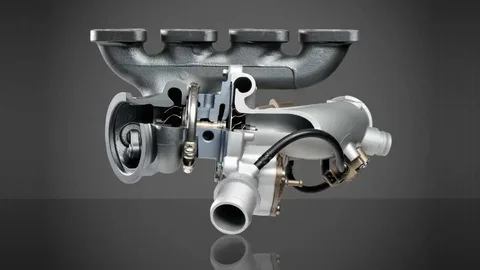
The global automotive turbocharger market is expected to reach USD 16.6 billion in 2023, and it is projected to expand to USD 41.5 billion by 2033. This growth is driven by a robust Compound Annual Growth Rate (CAGR) of 9.6% over the forecast period.
Turbochargers play a critical role in enhancing engine efficiency by compressing intake air, leading to improved combustion and power output. As governments worldwide implement stricter emission regulations, the demand for more fuel-efficient vehicles is pushing automakers to increasingly adopt turbocharging technology.
In turbocharged engines, exhaust gases drive a turbine that powers an air compressor. This compressor forces extra oxygen into the engine’s cylinders, allowing for more fuel combustion and significantly boosting fuel efficiency. By increasing the air pressure entering the engine, turbochargers contribute substantially to overall fuel economy.
Variable Geometry (VG) Turbochargers have gained prominence for their high efficiency across various engine speeds, outperforming traditional wastegate turbochargers. Their superior performance is attributed to variable mechanism stator vanes positioned at the turbine rotor blade’s input nozzle, optimizing supercharging efficiency.
When combined with Miller cycle direct injection gasoline engines, VG turbochargers can greatly enhance a vehicle’s fuel efficiency. The use of direct injection, alongside cooled exhaust gas recirculation, raises the knocking limit, making VG turbochargers an ideal solution for improving fuel economy.
E-turbochargers or electric turbochargers are expected to gain significant traction during the forecast period. Unlike conventional turbochargers, e-turbochargers use an electric motor to spool up the turbo, reducing turbo lag. Additionally, they can generate electricity for the vehicle’s electrical system, potentially reducing the alternator’s load on the engine and conserving fuel.
The increasing demand for improved engine performance is driven by the need for higher power density and precise torque control, particularly in downsized and down-speeded engines. This approach not only enhances fuel efficiency but also maintains dynamic vehicle performance, positioning turbochargers as a key component in modern automotive design.
Exhaustive Market Report: A Complete Study
Key Takeaways from the Automotive Turbocharger Market Report:
- In the historical period 2018 to 2022, the global automotive turbocharger industry expanded at a CAGR of 8.7%.
- The United States automotive turbocharger industry is expected to reach a valuation of US$ 1.8 billion by 2033.
- Germany automotive turbocharger industry is expected to top a value of USD 1.4 billion by 2033.
- By product type, the VGT segment is expected to dominate the automotive turbocharger industry with a CAGR of 9.8% from 2023 to 2033.
- China automotive turbocharger industry is anticipated to cross a valuation of USD 3.1 billion in 2033.
Competitive Landscape:
Several businesses would concentrate on increasing the range of products they offer to cater to demands of multiple vehicle segments. Offering turbochargers for a wider range of engine sizes and configurations is one way to do this. Additionally, turbochargers are being developed for alternative fuel vehicles such as electric and hydrogen-powered cars.
A select range of participants are making investments to create strategic alliances and partnerships with other businesses in the automobile sectors. Manufacturers, suppliers, and IT firms are a handful of these.
They want to create fresh and inventive products by utilizing their resources and experience. To increase their footprint, manufacturing organizations are putting even more of an emphasis on new product launches and acquisition tactics.
Leading Key Players:
- Continental AG
- Garett Motion Inc.
- Cummins Inc.
- Mitsubishi Heavy Industries Ltd.
- Toyota Industries Corporation
- Eaton Corporation Plc
- BorgWarner Inc.
- IHI Corporation
- BMTS Technology GmbH & Co. KG
- Weifang FuYuan Turbochargers Co., Ltd.
For instance,
- Cummins Inc. was entirely bought Meritor, Inc. in 2022. The latter is a well-known manufacturer of drivetrain, mobility, brakes, aftermarket, and electrical powertrain solutions for commercial vehicles & industrial industries.
- Toyota Motor Corp.’s Silicon Valley research branch acquired Renovo, a producer of automotive operating system software, in 2021. The company intends to speed the development of fully autonomous, networked vehicles.
Automotive Turbocharger Market Segmentation:
By Product Type:
- Waste Gate
- VGT
- Twin Turbo
By Vehicle Type:
- Passenger Cars
- LCV
- HCV
- Agricultural Machinery
- Construction Machinery
By Fuel Type:
- Gasoline
- Diesel
By Sales Channel:
- OEM
- Aftermarket
By Actuator:
- Hydraulic
- Electric
- Pneumatic
By Region:
- North America
- Latin America
- Asia Pacific
- Middle East & Africa
- Europe
About Future Market Insights (FMI)
Future Market Insights, Inc. (ESOMAR certified, recipient of the Stevie Award, and a member of the Greater New York Chamber of Commerce) offers profound insights into the driving factors that are boosting demand in the market. FMI stands as the leading global provider of market intelligence, advisory services, consulting, and events for the Packaging, Food and Beverage, Consumer Technology, Healthcare, Industrial, and Chemicals markets. With a vast team of over 400 analysts worldwide, FMI provides global, regional, and local expertise on diverse domains and industry trends across more than 110 countries.
Contact Us:
Future Market Insights Inc.
Christiana Corporate, 200 Continental Drive,
Suite 401, Newark, Delaware – 19713, USA
T: +1-845-579-5705
For Sales Enquiries: sales@futuremarketinsights.com
Website: https://www.futuremarketinsights.com
LinkedIn| Twitter| Blogs | YouTube

